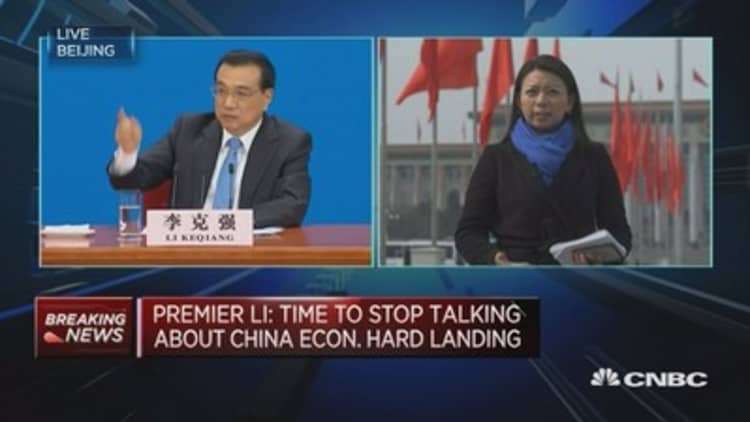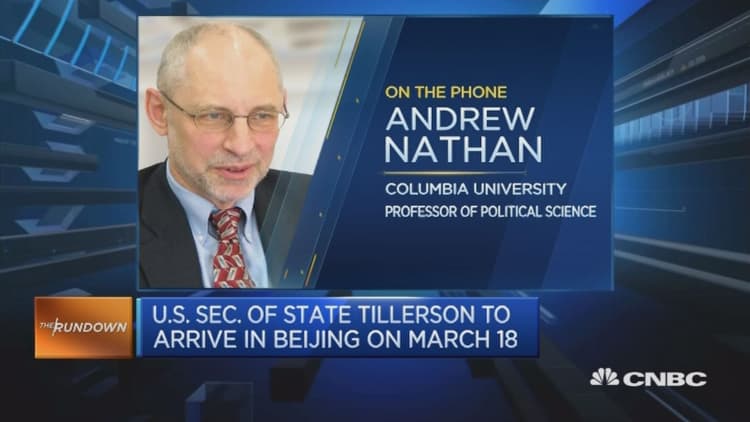
Chinese Premier Li Keqiang stressed the need for healthy Sino-U.S. relations and reiterated his country's stability across various sectors, including the economy, financial markets and foreign policy, at a Wednesday news conference.
Speaking at the conclusion of the nation's annual 'Two Sessions' meetings, Li said that Beijing and Washington should strengthen dialogue to resolve differences and achieve common ground on trade relations. "China doesn't want to see a trade war with the U.S.," Li said.
His remarks come ahead of scheduled talks between President Donald Trump and Chinese President Xi Jinping next month. The summit would be Trump's latest attempt to ameliorate bilateral ties after he criticized the Asian giant on a range of issues.
The bilateral relationship is also in close focus as Secretary of State Rex Tillerson arrives in Asia this week. The former Exxon executive will touch down in Beijing on Saturday, where he is expected to build a framework for talks ahead of Trump and Xi's meeting.
In a potential reference to Trump's controversial stance on free trade, Li said Beijing supported globalization and is committed to opening up its economy.
"All countries must work together on global trade," Li stated, adding that Beijing will participate in regional free-trade pacts. China has, in fact, already joined trade talks with member states of the Trans-Pacific Partnership (TPP) in Chile this week.
Li was speaking at the conclusion of two major Chinese political events that were closely followed by global markets: the Chinese People's Political Consultative Conference (CPPCC) and the National People's Congress (NPC).
The CPPCC, the mainland's top political advisory body, is branded as a type of consultative democracy, in which the body's 2,200 members, who come from various private-sector and cultural backgrounds, share suggestions with policymakers. The NPC, meanwhile, is a meeting of China's parliament, in which 3,000 delegates review the government's annual work report and draft provisions of civil law.
This year's work report, presented on March 5, set the nation's 2017 gross domestic product (GDP) target at 6.5 percent, below 2016's year goal of between 6.5 and 7 percent.
Li defended the 2017 target on Wednesday, saying the figure was not low and will not be easy to meet amid domestic and external risks. But the country still has plenty of policy tools at its disposal and will push ahead with reforms, he added. "It's time to stop talking about a China economic hard landing."
Pressure to create more jobs will be big this year, Li said, warning that Beijing would not allow mass unemployment. Economists have long warned of job cuts as the country embarks on supply-side structural reforms, such as slashing overcapacity in steel and coal industries.

Regarding local financial markets, Beijing is fully aware of threats in China's financial system, Li said, adding that the sector was generally stable, with no systemic risks.
Meanwhile, the nation will continue pushing reform for the yuan exchange rate, Li said, adding that the currency would remain stable. "China doesn't hope to use yuan depreciation to support exports."
Beijing is also looking to cut corporate taxes and fees by 1 trillion yuan ($146 billion), Li said.
On the topic of Asian politics, Li said tensions in the Korean peninsula could lead to conflict, referring to North Korea's latest missile launches. Dialogue is key to easing tensions, Li noted. "Nobody wants to see chaos on their doorstep."
The mainland traditionally has been Pyongyang's biggest trading partner and main source of aid but it recently suspended North Korean coal imports to comply with international sanctions.
Amid reports of new Chinese construction work in the disputed South China Sea, Li said his country hoped to maintain peace and stability in the area.
He also promised Beijing would "step up support" for the Hong Kong economy and announced plans to install debt market links between the city and the mainland, but he made no mention of the city's pro-democracy movement or upcoming elections.

